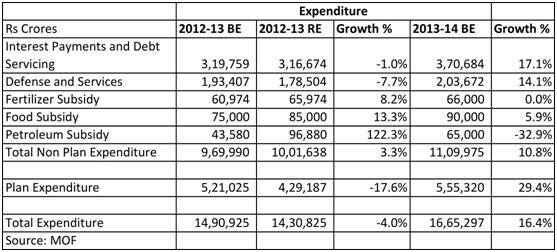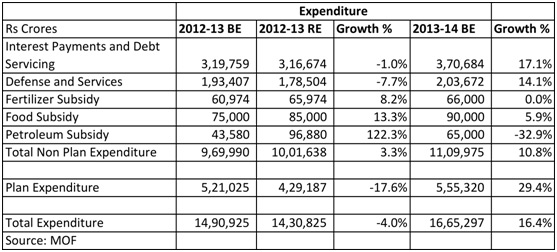Would you sell your house to buy a car? A house typically appreciates in value over many years, earns rent income or provides a strong foundation for a family. On the other hand, a car is a depreciable asset and loses almost all its value over a period of time.
Nobody in good senses would sell his or her house to buy a car. A car is usually bought from income and not by selling assets. However, the Indian government, in all its wisdom, is doing just that by selling assets to pay for expenditure that does not earn any income. The government indulges itself and its voters in the form of subsidies and this indulgence is not funded through revenues but from selling/ milking its assets.
Take for example 2013-14. The financial year is a clear example of the government falling short of revenue but still paying out subsidies and funding it through reduction in plan expenditure and selling/ milking its assets. Plan expenditure is government expenditure that goes into creation of infrastructure and other assets that will be beneficial for the economy in the long term.
Government expenditure for 2013-14
The government in its budget for 2013-14 forecast a 16.4 percent growth in its total expenditure. Non-plan expenditure, which includes defence services, subsidies and interest payments, was expected to grow 10.8 percent and plan expenditure was expected to grow 29.4 percent.
[caption id=“attachment_75753” align=“aligncenter” width=“557”]  Table 1[/caption]
Table 1 gives the budgeted expenditure of the government for 2013-14.
The government’s expenditure does not stick to a budgeted pattern, especially on the non-plan expenditure. As of January 2014, the government has largely exceeded its non-plan expenditure and has cut its plan expenditure size by 20 percent (as per reports) to keep down its fiscal deficit in the face of slow revenue growth. The government had already touched 95 percent of its fiscal deficit target of Rs 5,42,0000 crore in the April-December 2013. This indicates a sharp rise in spending on the back of higher subsidy payouts. Non-plan expenditure during the period was at 73 percent of budget estimates.
The government has under budgeted for fuel subsidy that is expected to be twice the budgeted amount of Rs 65,000 crore. The government is forcing upstream oil major ONGC to bear the burden of oil subsidy by making it pay a record Rs 13,700 crore to oil marketing companies in the the third quarter of 2013-14. ONGC had already born Rs 26,400 crores subsidy in the first half of fiscal 2013-14. The government is bleeding ONGC dry.
Government revenues in 2013-14
The government had budgeted for a 21.2 percent growth in total revenues for fiscal 2013-14 with 19 percent growth in tax revenues and 32.8 percent growth in non-tax revenues.
Table 2 gives the budgeted revenues of the government for fiscal 2013-14.
[caption id=“attachment_75757” align=“aligncenter” width=“600”]  Table 2[/caption]
The latest available figures indicate that direct tax collection growth at 12.5 percent for April-December is lower than the 17.5% growth budgeted for the full year. The growth of indirect tax collection at 6.2 percent during the period is also well below the full-year target of 20.3 percent.
On the non-tax receipts front, the government is well short of its disinvestment target of Rs 55,800 crore with just Rs 5,000 crore being raised. The government could raise an additional Rs 13,000 crore from its plans for disinvestment during January-March.
The government is making up the gap in disinvestment by forcing Coal India to pay a special interim dividend of Rs 16,485 crore. The government is milking the company’s assets to pay for a shortfall in thte government’s revenues.
The government is set to meet its spectrum auction target of Rs 23,000 crore as bids for the ongoing spectrum auction has crossed Rs 50,000 crore. Successful bidders need to pay around 25-33 percent upfront this fiscal if they choose to pay the amount in instalments.
The bottomline for 2013-14 is that the government has not been able to control non-plan expenditure (read subsidies) and with shortfall in tax revenues is resorting to cuts in plan expenditure and selling/milking its assets to keep fiscal deficit from ballooning.
Arjun Parthasarathy is the editor of www.investorsareidiots.com a web site for investors.


)
)
)
)
)
)
)
)
)



